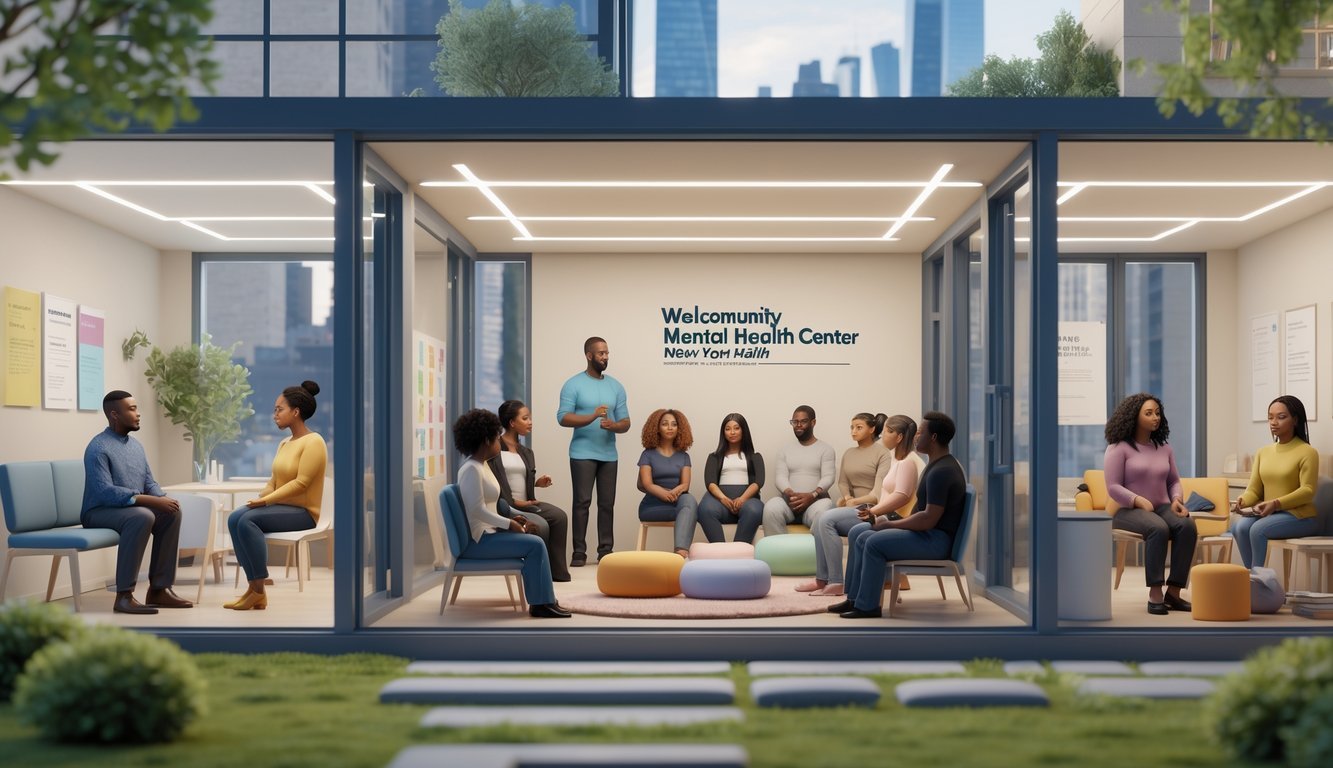PsychNewsDaily Publishers
100 Summit Drive
Burlington, MA, 01803
Telephone: (320) 349-2484
PsychNewsDaily Publishers
100 Summit Drive
Burlington, MA, 01803
Telephone: (320) 349-2484
New York offers extensive mental health support through state-funded programs, community centers, and crisis hotlines, ensuring access regardless of insurance or income status.

Finding mental health support in New York doesn’t have to break the bank. The state has a bunch of programs that help people get care, no matter their financial situation.
New York gives residents access to free mental health care through state-funded programs, community health centers, crisis hotlines, and new rules that make insurance plans offer behavioral health appointments within 10 business days. These services cover everything from immediate crisis support to ongoing therapy and specialized treatment.
If you need someone to talk to right away or want to look into long-term treatment, you’ll find that New York has really expanded its mental health resources. There are programs for different needs, such as walk-in crisis centers, services for specific groups, and tools to help you sort out insurance coverage or find a provider nearby.

New York has several ways for people to get free mental health care. State programs, community centers, and crisis services are open to most folks, even if you don’t have insurance.
You can get same-day crisis support and walk-in help at locations all over the city.
Free mental health care in New York covers crisis intervention, counseling, and psychiatric care. You can get emergency support at walk-in clinics and crisis centers.
The Adult Behavioral Health Crisis Center at Zucker Hillside Hospital runs a walk-in clinic for short-term psychiatric help. Their team has psychiatrists, nurse practitioners, social workers, and peer advocates.
Core services usually include:
Many programs also offer help with trauma, substance use, and domestic violence. Community organizations keep ongoing therapy and support groups free for people who need them.
Health Home services help people with complex health and mental health needs. These programs coordinate care when you see different providers.
Most free mental health services in New York don’t require a certain income or insurance. Crisis services are open to anyone who needs urgent help.
You can qualify even if you:
Some programs focus on specific groups. For example, there are services for youth, seniors, or people with developmental disabilities, and those might have age or diagnosis requirements.
Medicaid recipients can get extra services through managed care plans. New rules now require certain health insurance plans to offer initial outpatient behavioral health appointments within 10 business days.
Community health centers usually use sliding fee scales. If you have some income, you might pay a lower rate instead of getting care completely free.
You can get free mental health care in New York City in a few ways. Walk-in crisis centers let you show up without an appointment during their open hours.
Ways to get help right away:
Many community groups offer mental health support along with other services. NYC’s ACCESS website helps you find programs by location and type of need.
Insurance plans now have to keep their provider directories updated online. That makes it easier to find in-network mental health providers if you have insurance.
For ongoing care, just call a community health center. Most places can book an intake appointment within a few days of your first call.

New York has several free mental health programs and hotlines for both immediate help and longer-term care. People in New York can get behavioral health appointments within 10 business days if their insurance qualifies.
The 988 Suicide & Crisis Lifeline gives free, confidential support 24/7. You can call, text, or chat online with trained counselors who help with suicidal thoughts, mental health crises, and emotional distress.
The service connects you to local crisis centers in New York. Counselors listen to your situation and help you find mental health services nearby.
Highlights:
Peer counselors check in on your well-being and connect you to mental health services even if it’s not a full-blown emergency. You don’t have to wait for a crisis to reach out.
NAMI New York gives free education, support groups, and advocacy for people with mental health conditions and their families. They offer programs to help you understand mental health challenges.
NAMI runs support groups for both family members and people living with mental health conditions. Peer-led groups meet regularly around New York State.
Programs include:
NAMI also has a helpline. You can talk to trained volunteers for info about local resources and get help finding your way through the mental health system.
New York State and City fund several mental health programs that offer free services. The state shares info on suicide warning signs and risk factors through community groups.
New York City gives support after traumatic events like mass shootings or disasters. The city starts crisis counseling programs during emergencies.
State-funded services include:
Walk-in psychiatric services are available at crisis centers across the state. These centers give short-term help and connect you to long-term care.
Some programs focus on underserved communities. CUNY students can use free online peer support communities and mental health resources through their schools.

New York offers individual counseling, cognitive behavioral therapy, and peer support programs. Trained professionals and community support networks help people with different mental health needs.
Individual counseling gives you one-on-one time with a licensed mental health professional. You can talk about your concerns in private and work on personal goals.
Psychotherapy helps you understand your thoughts and feelings. Your therapist uses different methods that fit your needs.
Some common types:
Many clinics have walk-in psychiatric services so you can get help without an appointment. These services can also connect you to long-term care.
Sessions usually last 45 to 60 minutes. You might go weekly or every other week, depending on your plan.
Cognitive behavioral therapy works on changing negative thought patterns. You learn to spot harmful thinking and swap it for healthier ideas.
This care teaches you practical skills you can use every day. Your therapist gives you exercises to try between sessions.
Key techniques:
Behavioral care helps you change actions that cause trouble. You work on building better habits and letting go of the bad ones.
Most treatment combines cognitive and behavioral methods. This way, you get tools to manage symptoms and improve daily life.
Support groups bring you together with people who get what you’re going through. You can share your story and pick up tips from others who’ve been there.
Peer programs match you with someone who’s faced similar mental health struggles and recovered. Peer advocates offer encouragement and real-world advice.
Benefits:
Groups meet at community centers, hospitals, and even online. Some focus on specific issues like depression or anxiety.
Peer advocates often work with clinical staff to give you well-rounded support. They know the recovery process from experience.
New York has special mental health services for different groups and conditions. Kids, teens, people with depression, and those with disabilities or brain injuries can get care that’s tailored for them.
Many mental health centers in New York offer services just for young people. These programs get the unique challenges that kids and teens face.
Several places offer full child services. Montefiore Medical Center has a Moses Child Outpatient Program with individual and group therapy in English and Spanish. They accept all insurance and have sliding scale fees starting at $30 for people without insurance.
In Manhattan, you’ll find child-focused services at different spots. City College’s Psychological Center offers individual therapy, group counseling, and psychological testing for kids. Sessions start at $10 after a $30 intake fee.
Columbia University Teachers College’s Dean Hope Center provides therapy for all ages. They charge a $25 intake fee, and sliding scale sessions go up to $40. Group therapy is free.
Brooklyn and Queens have good child mental health options too. Community Counseling and Mediation works with children and has sliding scale fees starting at $35 per session. They accept Medicaid and Medicare.
Depression affects a lot of New Yorkers, and there’s specialized support across the city. Both individual and group therapy options help people manage mood disorders.
You can get crisis support 24/7 if you’re dealing with severe depression. Call or text 988 for immediate help. Spanish support is available by pressing 2, and they offer help in over 200 languages.
Group therapy offers peer support for managing depression. Montefiore Medical Center has individual and group therapy in English, Spanish, and Russian. Their sliding scale starts at $30 for folks without insurance.
Long Island University’s Psychological Services Center offers both individual and group therapy. Their sliding scale starts at $5 per session with a $50 intake fee.
A lot of centers use proven depression treatments. Cognitive-behavioral therapy is available at several locations. Asian Outreach Centers in Queens provide cognitive-behavioral therapy in English, Chinese, Korean, Spanish, Hindi, and Bengali.
People with disabilities and brain injuries can find mental health services designed just for them. These programs really get the kinds of mental health challenges folks in these groups deal with.
Mount Sinai’s Brain Injury Research Center offers cognitive and behavioral care to people who’ve had brain injuries. Faculty neuropsychologists and postdoctoral fellows handle the clinical services.
People with developmental disabilities have access to health home services made for their needs. Care Coordination Organization Health Homes focus on services for people with intellectual and developmental disabilities.
Some programs only accept people who meet certain requirements. Asian Outreach Centers ask that at least one family member has a mental health or substance use diagnosis. People with intellectual disabilities or autism can’t join these particular programs.
Several centers also offer psychological testing. That’s pretty helpful for anyone who needs a disability evaluation or a brain injury assessment. Long Island University does psychological testing and also runs individual and group therapy sessions.